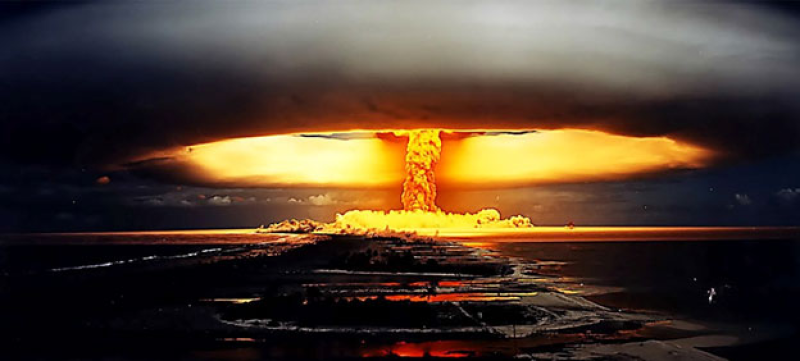- India Sees 9% Drop in Foreign Tourists as Bangladesh Visits Plunge |
- Dhaka Urges Restraint in Pakistan-Afghan War |
- Guterres Urges Action on Safe Migration Pact |
- OpenAI Raises $110B in Amazon-Led Funding |
- Puppet show enchants Children as Boi Mela comes alive on day 2 |
UN Scientific Panel to Study Nuclear War Consequences

A nuclear test that was carried out on an island in French Polynesia in 1971.
Rising nuclear threats in Europe and East Asia are increasingly ominous—particularly amid the ongoing Russia-Ukraine war and tensions on the Korean Peninsula.
The recent appointment of a 21-member panel of scientists, following a General Assembly resolution, has been described as “a response to a global environment in which the risk of nuclear war is higher than at any point since the depths of the Cold War.”
This move precedes the 80th anniversary of the Hiroshima and Nagasaki bombings in early August, which killed an estimated 150,000 to 246,000 people—mostly civilians—and remain the only instances of nuclear weapons used in war.
UN Secretary-General António Guterres recently warned:
“Nuclear weapons are wielded as tools of coercion, and nuclear arsenals are being upgraded. A nuclear arms race is once again a very real possibility. The guardrails against nuclear devastation are being eroded.”
A potentially more authoritative response may now emerge from the newly formed Scientific Panel on the Effects of Nuclear War.
Guterres announced that the panel, composed of independent experts, will examine the physical and societal consequences of nuclear war on local, regional, and global scales—spanning days, weeks, and decades after a potential conflict.
The panel’s scope includes assessing impacts on public health, ecosystems, agriculture, and global socioeconomic systems. The last major UN study of this nature was conducted in 1988.
Randy Rydell, former Senior Political Affairs Officer at the UN Office for Disarmament Affairs and Executive Advisor to Mayors for Peace, welcomed the move.
He said the General Assembly deserves credit for commissioning the panel—within its mandate to study and deliberate disarmament issues.
“In the face of renewed threats, soaring nuclear budgets, and stalled disarmament talks, this panel could educate the public—and leaders—on the catastrophic consequences of nuclear use,” he said. “Disarmament remains the only sure path to eliminate such threats.”
The panelists are internationally recognized leaders across scientific disciplines. They will consult with global stakeholders, including regional organizations, the International Committee of the Red Cross, civil society groups, and affected communities.
The panel will convene its first meeting in September and deliver its final report to the General Assembly in 2027.
Jonathan Granoff, President of the Global Security Institute, said the unleashing of nuclear weapons by any of the nine nuclear-armed states (UK, US, Russia, China, France, Israel, Pakistan, India, and North Korea) would bring unimaginable devastation.
"The panel’s hard scientific approach may help awaken public and political consciousness. The destruction wouldn’t just affect humans, but millions of other species—plants, insects, fish, birds, and mammals," he warned.
Granoff emphasized that the objective, science-based analysis of nuclear weapon effects should drive renewed global cooperation and policy change:
“Trustworthy empirical knowledge and public awareness could revive the progress that once reduced global arsenals from 70,000 to fewer than 13,000.”
He also referenced a 1991 UN report stating that nuclear weapons represent “a historically new form of weaponry with unparalleled destructive potential.” A single large nuclear detonation, it found, could release more energy than all conventional weapons used in past wars combined.
In 1995, the Canberra Commission concluded:
“The destructiveness of nuclear weapons is immense. Any use would be catastrophic... If the peoples of the world understood the dangers, they would reject them.”
Professor Zia Mian of Princeton University noted that his program had called for such a UN study as far back as 2015. A 2023 report from the Scientific Advisory Group of the Treaty on the Prohibition of Nuclear Weapons (TPNW) reinforced that call.
The group recommended a global scientific study on the cascading humanitarian, environmental, and social effects of nuclear war—spanning weeks to decades.
Professor Mian, who co-chairs the TPNW Scientific Advisory Group, said the new UN panel is now tasked with producing a comprehensive report, drawing conclusions, and identifying areas for future research. The findings will be submitted to the General Assembly in 2027.
The last major UN cross-disciplinary study of nuclear war effects was conducted in 1988 (Study on the Climatic and Other Global Effects of Nuclear War, UN publication, Sales No. E.89.IX.1).

